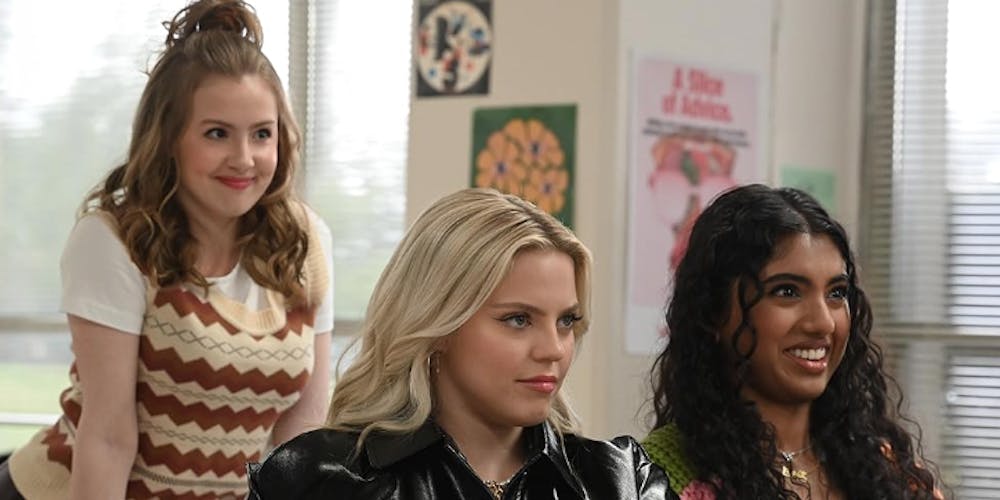What do “Roald Dahl’s Matilda the Musical” and “Mean Girls (2024)” have in common? On the surface, not much. However, both are recent movie musicals adapted from stage musicals that were based on movies originally based on a book. Despite the similarities, reactions to the two adaptations have been vastly different. “Roald Dahl’s Matilda the Musical” has a Rotten Tomatoes score of 93%, while “Mean Girls (2024)” has a score of 70%. While it’s not uncommon for movie musicals to receive mixed reviews (just look at the “Dear Evan Hansen” adaptation that came out in 2021), what made “Roald Dahl’s Matilda the Musical” so successful and “Mean Girls” not quite so successful?
First, it’s necessary to go back to the stage musicals that these movies are based on.
Opening on the West End in 2011, “Matilda the Musical” received high praise from critics, with four and five-star reviews. Daily Express’s Julie Carpenter called it “[g]loriously over the top [and] irresistible.” Praise continued when the show moved to Broadway in 2013, with Richard Zoglin for Time magazine saying, “[the score] seems all but woven into the scenery—simple but distinctive tunes … intricate lyrics … Every element of the show seems hand-crafted and right.” Some critics had an issue with the runtime, though many noted that it didn’t hamper their enjoyment of the show.
In 2018, “Mean Girls” made its debut on Broadway to more lukewarm reviews. Ben Brantley for The New York Times criticized the “less assured translation of [creator Tina Fey’s] sly take on adolescent social angst into crowd-pleasing song and dance.” Some reviewers felt more positively, with one reviewer for Entertainment Weekly giving it a B+, stating that it was “[p]ropelled by dazzling set design and several stand-out performances.” A West End transfer was planned in 2021 but was canceled due to the pandemic. It is now expected to open in June 2024.
Reactions to the musical versions of these properties follow a similar trend to how their respective movie musical adaptations were received. It makes sense—if the source you’re adapting from is shaky, then the result is bound to be a little shaky as well.
Another aspect to examine is how these movie musicals were promoted.
In the first few seconds of the official trailer for “Roald Dahl’s Matilda the Musical,” you hear a young girl singing a slightly melancholy excerpt of the song “When I Grow Up.” The ensemble joins in, with the trailer edited to match the beats of the song. In the two-and-a-half-minute trailer, snippets from three songs are played, including one of the show’s most popular numbers, “Revolting Children.” Teasers of these songs are shown throughout the trailer, along with highly stylized dance numbers. If this wasn’t enough for the audience to realize they’re watching a musical, the title of the movie is certainly enough to give it away.
On the other hand, “Mean Girls (2024)” made a concerted effort to not reveal that it is not just a remake of the 2004 classic, but also an adaptation of the stage production. The title is simply “Mean Girls (2024).” Instead of songs from the actual musical scoring the trailer, Olivia Rodrigo’s “get him back!” plays over new versions of iconic scenes from the original movie. Not even the video description shows any indication that this is a musical. When fans of the Broadway show noticed this, studios claimed that labeling a production as a musical turns potential fans away from watching.
However, is not disclosing that fact really a better option? In early January of this year, a viral TikTok showed audience members groaning and laughing when a character began singing. This begs the question “Who is this for?” People who already don’t like musicals aren’t going to be inclined to stay if they feel tricked into seeing one, and musical theater fans are going to be upset that none of the songs they love are featured in the trailer. It feels like a lose-lose situation for everyone.
The third aspect to discuss is the music itself.
When the official “Mean Girls (Music From The Motion Picture)” album was released, fans noted differences between the original Broadway cast recording. For one, several songs have been cut, including fan favorites like “Stop,” “It Roars” and “More Is Better.” There are also several lyric changes, and some characters sing lines that were originally sung by other characters. While Cady’s love interest, Aaron, had brief singing moments in the stage musical, he has none in the movie. The most noticeable change is the instrumentation of the songs. Instead of sounding like it belongs on the stage, the movie version of the songs feel more like something you’d find in the “trending sounds” on TikTok.
On the other hand, “Roald Dahl’s Matilda the Musical” is clearly a musical that doesn’t attempt to cater to those who aren’t fans of the genre. While the movie only features thirteen musical numbers (compared to the stage show’s twenty-six), this seems to have only served the film. By reducing the number of songs, 45 minutes was shaved from the original runtime, appeasing those critics whose only gripes of the show were its length.
The fourth and final comparison is the lead actors.
Though she was only 11 years old when she was cast as Matilda Wormwood, Alisha Weir already had a long list of stage credits to her name. She appeared in the musical “Once” at Dublin’s Olympia Theatre in 2017 and worked in productions of “Annie,” “The Wizard of Oz” and “Oliver!” at the National Concert Hall, also in Dublin.
In contrast, Angourie Rice, who was cast as Cady Heron, not only has zero musical credits, but she doesn’t have any stage credits either. She’s most well-known for playing Betty Brant in the recent Spider-Man movies and Siobhan Sheehan in the TV show “Mare of Easttown.” This lack of singing experience is noticeable, especially against powerhouse vocalists like Reneé Rapp, returning to the role after playing Regina George on Broadway, Auli’i Cravalho, the voice of Moana, and Jaquel Spivey, who was nominated for a Tony Award for his role as Usher in Broadway’s production of “A Strange Loop.”
After comparing these two movies, it’s clear that “Mean Girls (2024)” would’ve been much more successful had it followed the formula of “Roald Dahl’s Matilda the Musical."
Laynie Rearick (she/her) is a freshman majoring in American Sign Language interpretation and was co-editor of her high school’s newspaper. She joined Campus Citizen because she likes to write and has a lot of opinions.





